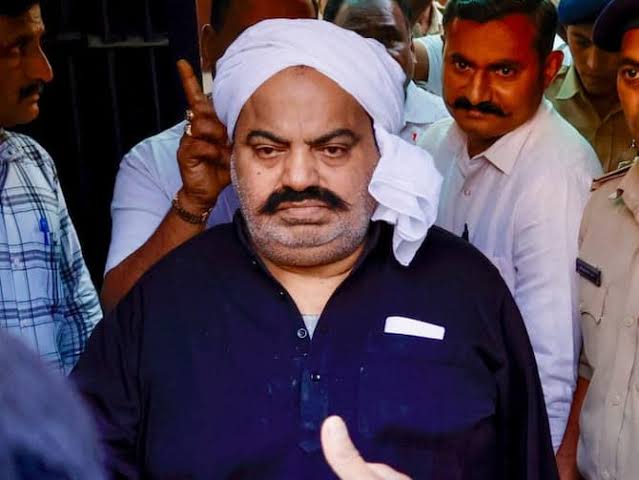One more gangster will soon be immortalised on celluloid.
The beatification of underworld-don-cum politician Atiq Ahmed is underway. He has many feathers in his cap—a convicted criminal, a former Member of Parliament, a former Member of the Uttar Pradesh Legislative Assembly, and the first person to be booked under the Gangster Act in Uttar Pradesh. But the most colourful feather in his cap is that he earned his spurs and gained notoriety for extortion, kidnapping, and murder. Ahmed entered the world of crime by stealing coal from trains and selling it for a profit. This later aggrandized into threatening contractors for obtaining government tenders for railway scrap metal. His first criminal record was in 1979, when he was accused of murder in Allahabad. But the enormous financial clout coupled with brazen bravado to defy the law, sabotage the law and cripple the law gave him a cloak of invincibility. No wonder he was much sought after by politicians for funds, threatening rivals, fixing illegal transactions and bumping off intransigent challengers.
The lone wolf enterprise soon expanded to become a pack of wolves by inducting his wife and sons, in order to sustain the slew of criminal activities entrusted to them. It was a dreaded family mafia, ruthless and extremely violent, functioning unhindered and beyond the pale of law. His activities soon resembled the Mafia’s core activities, which are protection racketeering, the arbitration of disputes between criminals, and the organising and oversight of illegal agreements and transactions. He could buy anyone or kill anyone; a typical godfather, like in the movies. Ordinary citizens recall with fear and awe movies like Gangs of Wasseypur or Once Upon a Time in Mumbai that glorified gangsters and mindless violence.
If Hollywood had glorified Godfather and made the criminal lifestyle seem glamorous in the short run but not worth it in the long run, Indian Bollywood also adapted the same narrative. In Scarface, Al Pacino luxuriates in a tub but ends up killed by a storm of bullets. In the Godfather movies, Al Pacino overcomes his enemies but alienates most of his loved ones. He dies a truly pitiable death in anguish at the end of Godfather III. Shah Rukh Khan’s character in Raees was heavily inspired by the late underworld don Abdul Latif, who once ran the biggest alcohol mafia in Gujarat.
There is no doubt that Bollywood movies glorify and adulate gangsters. Their characters are larger than life and are scripted in a way that audiences end up idolizing them, as the Indian criminal justice system is generally perceived as helpless and hopeless, especially when it comes to tackling rapes, murders, terror violence, and destruction of public property. Hence, films on the “Hyderabad encounter” have the enthusiastic approval of society.
If courts are incapable of delivering instant justice in spite of fast track courts, then police officers who mete out instant justice are accoladed with titles like “Singham”. If films like Ab Tak Chhappan get appreciative approval from audiences, it is a clear reflection of the disenchantment of society with the manner that the judiciary conducts itself. A large section of our society deems encounters as the most effective to bypass an indolent and ineffective judiciary. Hence, films like Rang De Basanti have used the concept of “instant justice” and rebellion as justified, instead of complying with the due process of law.
Atiq Ahmed had reconciled himself to the idea that his chosen profession of gangsterism would one day reward him with an “encounter death” at the hands of the police or that an upcoming younger rival would assassinate him. There is no political protection umbrella enveloping a gangster eternally. A time comes when the umbrella snaps abruptly, and life is wrenched out, cruelly, just as they had done to their victims in their heydays.
Now certain political parties, who were beneficiaries of his loot-money, are demanding a judicial probe, a special investigation team probe, and even National Human Rights Commission (NHRC) intervention. But what is worrisome is Al-Qaeda in the Indian Subcontinent (AQIS) has threatened attacks in India over the assassination of gangster Atiq Ahmed. In its Eid message, the terror group threatened revenge and called Atiq and his brother Ashraf “martyrs”. This is a problem that the police will have to handle in the coming days—illegal and unknown organisations conferring martyrdom on ineligible persons. Where foreign fundamentalist organisations intervene in our political landscape and threaten revenge and retaliation. There will also be film producers who will want to glamorise the dead gangster by weaving the script of a family in poverty, hardship, a rebellious youngster rising against odds, acquiring wealth by outsmarting rivals, political patronage, charity using extorted money, a dash of romance, conspiracy to eliminate him, and finally a secret assassination. One more gangster will soon be immortalised on celluloid.
* Dr G. Shreekumar Menon IRS (Rtd) is former Director General, National Academy of Customs, Indirect Taxes & Narcotics.

